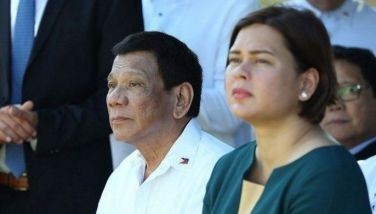Palace clarifies: Duterte’s statement telling US troops to leave not yet a policy
MANILA, Philippines – Malacañang on Tuesday sought to downplay President Rodrigo Duterte’s statement that he wants American troops out of Mindanao, saying it is not yet a policy and does not indicate that the Philippines is turning its back on its alliance with the US.
Presidential spokesman Ernesto Abella said the president merely issued an “injunction” and a “warning” about the risks being faced by Americans in Mindanao.
"Those statements are not policies set in stone," Abella said in a press briefing.
"It's not a policy yet...Nobody acted on it yet. It serves as a notice," he added.
Abella admitted though that Duterte’s remarks are “layered” and can be interpreted in several ways.
When reminded that every statement of the president is perceived as a policy, Abella replied: “It's not automatically policy but it is a basis of policy.”
Abella maintained that Duterte’s remarks would not affect the implementation of the Enhanced Defense Cooperation Agreement (EDCA) and the Visiting Forces Agreement (VFA). EDCA grants the US access to Philippine military bases while VFA allows American troops to hold joint exercises with Filipino soldiers on Philippine soil.
“We're not turning back on anybody. We are just charting an independent course,” the presidential spokesman said.
Some US servicemen have been sent in Zamboanga City to help Philippine troops track down terrorist groups. Their role is limited to trainings and information sharing because the 1987 Constitution bars foreign troops from joining combat operations.
There are less than 200 American soldiers in Mindanao, according to a ranking military official who asked not to be named.
On Monday, Duterte said American troops should leave Mindanao as US presence in the area could aggravate security risks.
“The special forces, they have to go. They have to go in Mindanao,” the president said after the oath taking of new appointees in Malacañang.
“The situation there (in Mindanao) will worsen. If they (Americans) are seen there, they will be killed,” he added.
Duterte made the remarks after criticizing the US for its past atrocities, including the massacre of about 1,000 Moros in Bud Dajo in Sulu in 1906. He also issued the statement after the US had raised concerns over the Philippines’s anti-drug war, which has been criticized for supposedly encouraging extrajudicial killings.
“It's (Bud Dajo massacre) a lingering skeleton...which removes moral ascendancy of those criticizing the Philippines for killings,” Abella said.
“He (Duterte) is uncovering something that has not been addressed.”
- Latest
- Trending





























